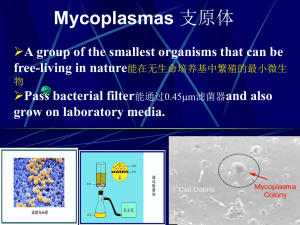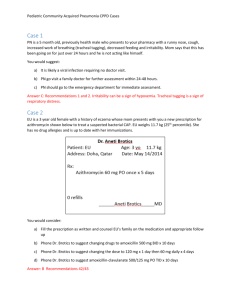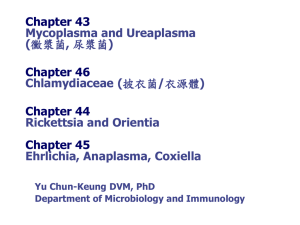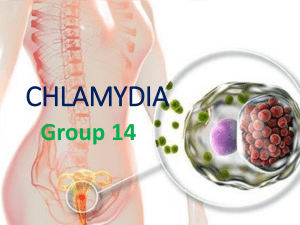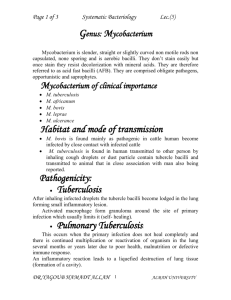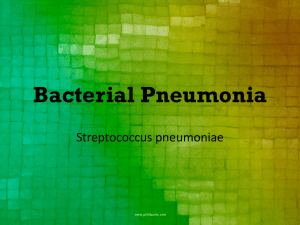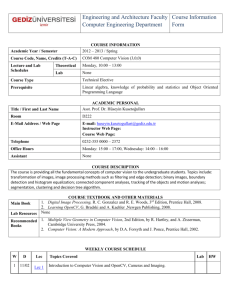Genus: Chlamydia
advertisement
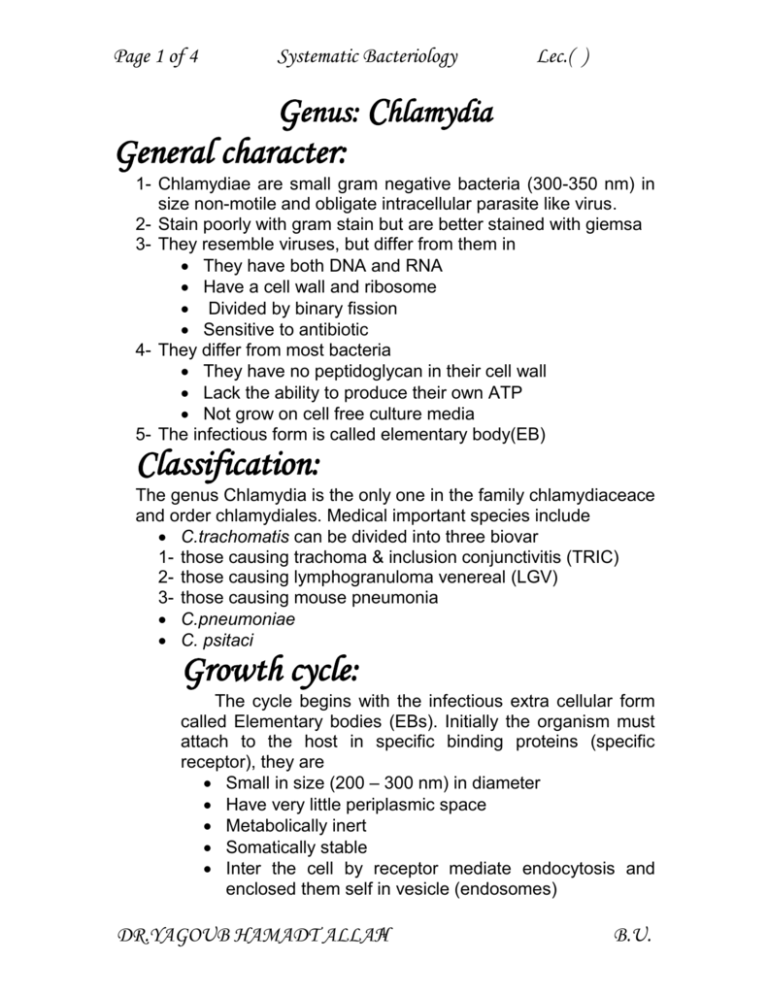
Page 1 of 4 Systematic Bacteriology Lec.( ) Genus: Chlamydia General character: 1- Chlamydiae are small gram negative bacteria (300-350 nm) in size non-motile and obligate intracellular parasite like virus. 2- Stain poorly with gram stain but are better stained with giemsa 3- They resemble viruses, but differ from them in They have both DNA and RNA Have a cell wall and ribosome Divided by binary fission Sensitive to antibiotic 4- They differ from most bacteria They have no peptidoglycan in their cell wall Lack the ability to produce their own ATP Not grow on cell free culture media 5- The infectious form is called elementary body(EB) Classification: The genus Chlamydia is the only one in the family chlamydiaceace and order chlamydiales. Medical important species include C.trachomatis can be divided into three biovar 1- those causing trachoma & inclusion conjunctivitis (TRIC) 2- those causing lymphogranuloma venereal (LGV) 3- those causing mouse pneumonia C.pneumoniae C. psitaci Growth cycle: The cycle begins with the infectious extra cellular form called Elementary bodies (EBs). Initially the organism must attach to the host in specific binding proteins (specific receptor), they are Small in size (200 – 300 nm) in diameter Have very little periplasmic space Metabolically inert Somatically stable Inter the cell by receptor mediate endocytosis and enclosed them self in vesicle (endosomes) DR.YAGOUB HAMADT ALLAH1 B.U. Page 2 of 4 Systematic Bacteriology Lec.( ) In the vesicle the EB loses its dense DNA core. The cell wall becomes less rigid due to breaking of the disulphide bodies. The particle increase in size and become reticulate bodies (RBs) it is About (800 – 1000 nm) in diameter Metabolically inert Somatically fragile Replicate by binary fission with in endosome Later the DNA is recognized into core for the progeny EB. DR.YAGOUB HAMADT ALLAH2 B.U. Page 3 of 4 Systematic Bacteriology Lec.( ) Pathogenecity: C.trachomatis causes: 1- Eye infection: (Trachoma by serovar A, B, Ba and C) Is a serious eye disease (inflammation in conjunctiva and cornea) if not treated may lead to blindness. Spreading by transfer of infected discharge from the eye of one person to an other by flies or contaminated hands, clothing or towels. Neonatal ophthalmic (serovars D to K) occur in newborn infant (7 – 12 days after delivery) 2- Genital tract infection: In man cause urethritis (non – gonococcal infection) in women cause mucopurulent cervicitis (often asymptomatic 6% or more) 3- Lymphogranuloma venereum (LGV) Cause by serovars (L1 – L2 – L3) is sexual transmitted disease in both male and female. 4- Pneumonia: Occur in newborn and infant (2 – 12 weeks after birth) C.pneumoniae: formally called TWARA) Taiwan acute respiratory agents. C.psittasi it cause psittacosis (pathogen of birth) it is pneumonia or influenza – like illness (transmitted by aerosols lead to a typical pneumonia in man. Diagnosis: Specimens: depending on the site of infection include conjunctival scraping, blood, sputum and swabs of urethra, end – cervix and conjunctiva. Detection of organism in Giemsa stain and iodine stained examining microscopically using 40X and 100X. Look for epithelial cell contain inclusion bodies (vary in shape and size and shape), appear blue – mauve stained (RB) OR less dense mass mauve – red color (EB) REPORT CHLAMYDIAL INCLUSION BODIES PRESNT OR NO CHLAMYDIAL INCLUSION BODIES SEEN) IN iodine preparation: C.trachomatis inclusion contain glygen which stained brawn color (not sensitive) DR.YAGOUB HAMADT ALLAH3 B.U. Page 4 of 4 Systematic Bacteriology Lec.( ) Cultivation: May be isolated in either embryonated egg or tissue culture. However Mc coy cells treated with cycloheximide are the most widely used, although C.pneumoniae grow better in Hella or HL cell the presence of the organism is detected by staining for inclusions or EBs (the disadvantage of culture is that it only detects viable organism. Immunological test Using monoclonal antibodies EIA ICT Also by nucleic acid detection Treatment Tetracycline in adult and erythromycin in babies. DR.YAGOUB HAMADT ALLAH4 B.U.
